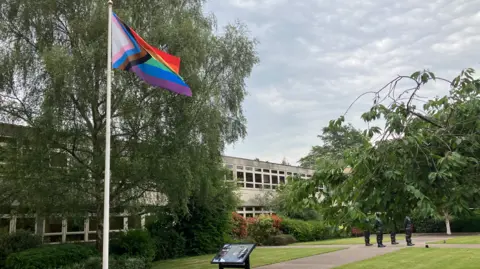In a recent shift in policy, the leadership at Leicestershire County Council, under the new Reform administration, has made significant changes regarding the flag flying protocol. This move was initiated during their inaugural cabinet meeting and has sparked considerable discussion and concern among various staff groups and the public. The outcome of the meeting was the abolition of the council’s previously established schedule for flying various flags that celebrated different communities and events within Leicestershire.
Historically, the council had a diverse flag-flying agenda, which included flags representing LGBTQ+ Pride Month, Windrush Day, and Gypsy Roma and Traveller History Month. These flags were emblematic of the council’s commitment to inclusivity and recognition of the broad spectrum of identities and events that contribute to the local culture. However, the new council leader, Dan Harrison, justified this alteration as a step towards celebrating “British values that unite us all,” indicating a preference for a more homogenized national identity over specific cultural acknowledgments.
During the meeting, Harrison, leading the Reform council which had recently formed a minority administration, described the change as historic and of great significance. He articulated the reasoning behind the policy shift, suggesting that it aligns the council’s image more closely with national identity and heritage. Harrison posited that such a protocol would foster unity and pride among residents, highlighting a desire to focus on what he believes are the foundational values of the country.
Nonetheless, this decision has not gone without repercussions. Concerns quickly emerged from various staff groups within the council. Critics argue that the changes fail to recognize the importance of representation and the diverse identities within the community. Representatives from LGBTQ+, disabled, and BAME staff noted in a joint letter that they were not adequately consulted prior to the decision. They expressed their belief that the flag’s symbolism plays a crucial role in fostering good relations among individuals with differing characteristics, a tenet grounded in the Public Sector Equality Duty.
The contention surrounding this issue further intensified as opposition leaders weighed in. Deborah Taylor, leading the Conservative opposition group, characterized the proceedings as peculiar and called on the council to be more responsive to the staff’s concerns. Taylor emphasized the necessity for the council staff, committed to serving the Leicestershire community, to have their voices acknowledged and considered in decision-making processes.
As part of the new flag protocol established by the Reform administration, only the Union flag and the Leicestershire County Council’s own flag will be flown permanently on two of the three available flagpoles outside County Hall. The third flagpole is designated for St. George’s flag, unless it is temporarily replaced with the flag of the county’s Lord Lieutenant. Additionally, a fourth flagpole inside the quadrangle may be utilized for specific events such as Armed Forces Day and Commonwealth Day.
Council leader Harrison stated that all decisions on flying other flags would now fall under the purview of the Chief Executive, John Sinnott, following discussions with him. This decision-making shift has raised concerns about the transparency and inclusivity of future flag-related policies and the potential alienation of various community groups.
In conclusion, while the new leadership at Leicestershire County Council aims to embody what it considers traditional British values, the implications of such a singular approach towards flag-flying are profound. The transition signifies a pivotal moment in how the council interacts with its diverse constituents, emphasizing the delicate balance between national identity and the celebration of local cultures. How these changes will affect community morale and employee engagement remains to be seen, as council members and staff continue dialogues amidst the ongoing tensions.



